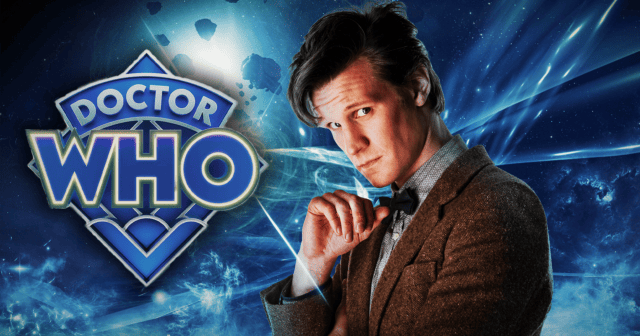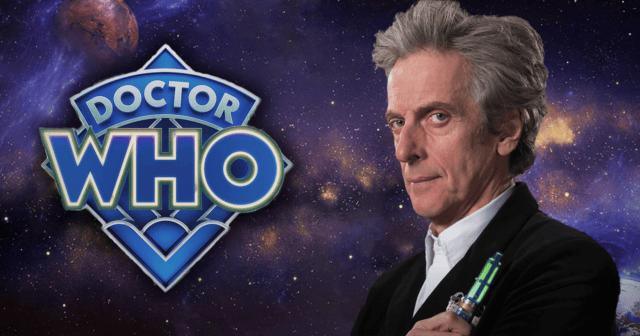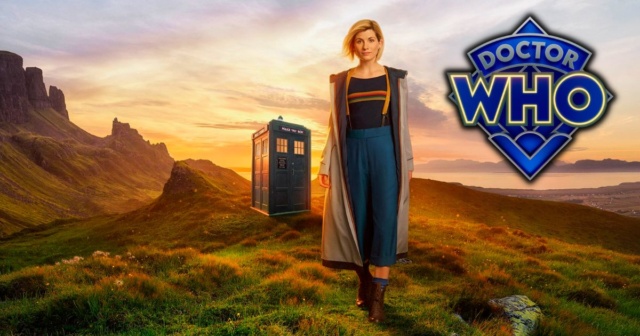Best David Tennant’s Tenth Doctor Episodes of ‘Doctor Who’

By now, the entire Doctor Who fandom is aware that the beloved David Tennant will be returning to the TARDIS, this time as the Fourteenth Doctor. This will make him the first actor to play two different incarnations of the Time Lord. (Three, if you count the Meta-Crisis Regeneration Doctor. Then, of course, there’s Tom Baker’s Curator Doctor from “The Day of the Doctor”…. You know, it’s probably best not to think about it too hard.) Whatever the case, it’s safe to say the hype for the incoming 60th Anniversary Special Trilogy is huge. Whovians eagerly await this new incarnation of the Time Lord, wondering how much he will have in common with the Tenth Doctor, and what will be different this time around.
In honor of Tennant’s return, I’ll be counting down my picks for the 10 Best Tenth Doctor episodes. This was exceedingly difficult to choose from, as the Tenth Doctor’s era was one of the strongest in the show’s 60-year history. From beginning to end, it sports numerous entries that are in the running for greatest-of-all-time territory.
[Warning: Spoilers from the Doctor Who series are below!]
“Army of Ghosts” / “Doomsday” written by Russell T. Davies (series 2, episodes 12-13)
Starting off strong, we have the grand finale of Series 2, Tennant’s first season in the TARDIS. This season was pretty mixed, featuring both some of Tennant’s strongest episodes and his weakest. Thankfully, we ended on a grand finale that gave a dimension-shattering sendoff to our first NuWho companion, Rose Tyler (Billie Piper).
Ten and Rose land on present-day Earth. There, they find that for the past two months, mysterious ghosts have been appearing all over the world. The humans of Earth have slowly accepted the ghosts, believing them to be spirits of the lost loved ones.
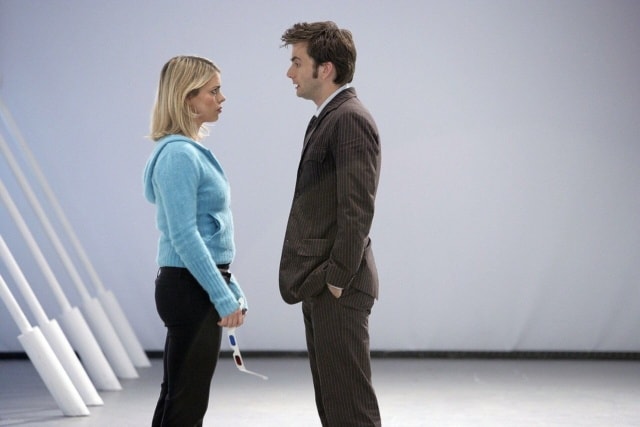
Naturally, these are not actual ghosts, but alternate-universe Cybermen trying to make their way into this universe. But the Cybermen themselves are not the ones who have breached the barrier between worlds. Rather, the Daleks caused the breach in a Void ship, and the Cybermen simply followed them through.
What ensues is an absolute over-the-top slugfest, featuring the Cyberman-Dalek war everyone was waiting for, the first proper appearance of Torchwood, the return of Mickey Smith, big sci-fi guns, and Freema Agyeman’s first appearance on the show as Martha Jones’s (identical?) cousin Adeola Oshodi.
This all culminates in one of the most heartbreaking companion sendoffs in the show. Rose nearly falls into the void between worlds, before the alternate-universe version of her father saves her last minute. But this leaves Rose stranded in said alternate universe, alone and without the Doctor. Ten burns up an entire star, just to send one final message to Rose in the alternate universe. But tragically the star burns out before he can say those magical three words to her. Who didn’t cry watching this episode?
And to top it all off, the beloved Donna Noble (Catherine Tate) makes her first appearance in the episode’s final seconds. Truly a legendary first impression.
“42” written by Chris Chibnall (series 3, episode 7)
This holds a special place in my heart as one of Ten’s most underappreciated episodes. (In fact, I covered it in my article on the most underrated Russell T. Davies-era stories). The premise is simple: Ten and Martha land on a mining ship out in the far reaches of space and are separated from the TARDIS. They quickly learn that the SS Pentallian is 42 minutes from falling into a star. To make matters worse, something is infecting the minds of the crew, turning them unnaturally hot, and causing them to kill off their crewmates.
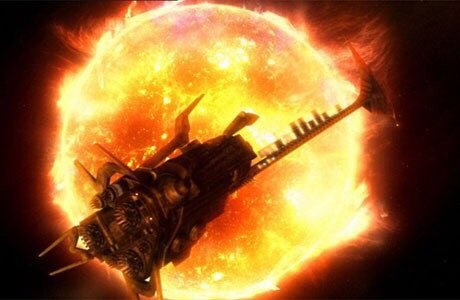
What makes “42” so special is that it’s the first Who episode set in real-time. As the clock to destruction slowly counts down, the tension rises almost unbearable. Rarely has Doctor Who conveyed the sense of tension, urgency, and impending doom so well. “42” is sure to have your heart racing from start to finish, even upon rewatch.
Additionally, the concept of a sentient star is mind-bending, both cosmically horrifying and beautiful.
“42” was also Chris Chibnall’s first episode, and regardless of how you feel about his era as showrunner, this episode is undoubtedly a highlight in his Who career.
“Rise of the Cybermen” / “Age of Steel” written by Tom Macrae (series 2, episodes 5-6)
This is another entry on this list which I covered on my underrated RTD episodes list. Unfortunately, the first appearance of the Cybermen in NuWho doesn’t get nearly enough love.
Although the necessity of the AU-Cybermen was questionable, this episode is still fantastic. Ten, Rose, and Mickey get stranded in an alternate version of England, featuring airships, long-lost relatives, and AirPods fifteen years too early. They discover that Cybus Industries has been scheming to convert all of humanity into a familiar enemy: the Cybermen.
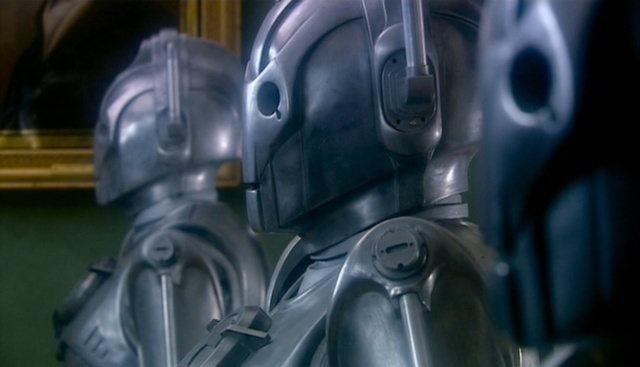
Although the Cybermen are exceptionally intimidating in this episode, the real emotional core of “Rise of the Cybermen” / “Age of Steel” lies with Rose and Mickey visiting the alternate universe. While Mickey visits his grandmother one last time, Rose visits her father (who died when she was a baby in the main timeline). Her finding that he is not the man she thought is heartbreaking stuff. Moreover, the scene of Rose being berated by the AU version of Jackie makes for an exceptionally hard watch.
“The Stolen Earth” / “Journey’s End” written by Russell T. Davies (series 4, episodes 12-13)
Although Ten wouldn’t regenerate until 2010’s “The End of Time: Part 2”, this two-parter serves in many ways as the grand finale to the Tenth Doctor era.
Ten and Donna land on present-day Earth, fearing disaster. Just as they do, the entire planet gets whisked away by, you guessed it, the Daleks. The Doctor’s allies across the Earth unite to fight them, including Martha Jones, Jack Harkness, UNIT, Torchwood, Sarah Jane and Luke Smith, Harriet Jones (former Prime Minister), and incredibly, Rose, Pete and Mickey, who have all warped in from the alternate universe.
They discover that Davros (making his first appearance in NuWho), has a master plan to destroy the entire universe using the power generated by Earth, along with 26 other stolen planets. Ten, Donna, and all his former companions and friends unite to defeat Davros, culminating in an epic scene of all these characters in the TARDIS together, towing the entire Earth back to its rightful place.
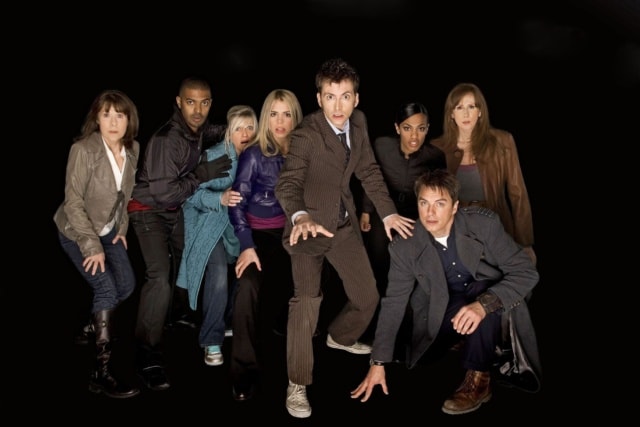
It’s hard to understate just how thrilling it was to see all these characters together. Although Ten is the only Doctor in this story, “The Stolen Earth” / “Journey’s End” still manages to capture the feeling of the classic Who multi-doctor stories. It’s an epic and climactic adventure that still gives me chills whenever I rewatch.
Of course, this episode packs an emotional punch as well. Seeing the Doctor have to deal with the reality that countless people have sacrificed themselves for him is tear-jerking every time. But the real tear-jerker in this episode is the painful farewell to Donna Noble. After absorbing part of the Doctor’s mind, she needs to have all her memories of the Doctor and the TARDIS erased in order to survive. It’s hard to imagine a much sadder fate for a companion short of death—forgetting all the wonderful adventures she’s had in the TARDIS.
I, for one, am anxiously looking forward to Donna’s return in the 60th Anniversary specials. However, I hope RTD will handle it in a way that doesn’t undercut just how heartbreaking “Journey’s End” was.
“The Girl in the Fireplace” written by Steven Moffat (series 2, episode 4)
Steven Moffat’s first episode of the Tenth Doctor is undoubtedly a masterpiece and one that fans remember as one of the best historical episodes in the show.
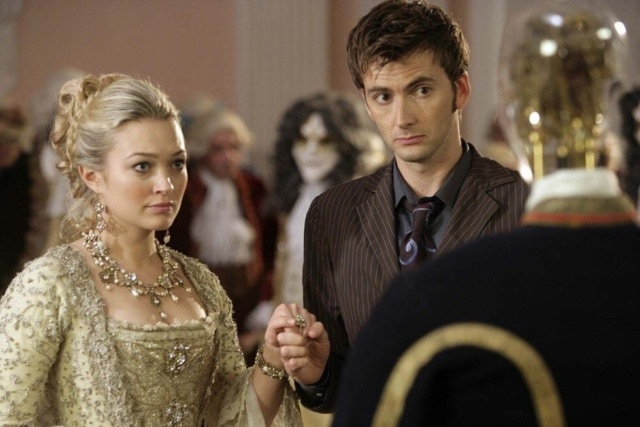
Ten, Rose, and Mickey discover an abandoned spaceship floating in space in the 51st century. They quickly learn that the ship is not all it seems: several parts have been replaced with human body parts. Moreover, there are several other elements of the ship that are oddly out of place, notably an 18th-century French fireplace.
The Doctor discovers that the ship has formed a passageway through time into the bedroom of none other than Madame de Pompadour. The ship’s clockwork droid crew are after her, trying to retrieve her brain to replace the command circuit of the ship.
“The Girl in the Fireplace” tells an enchanting love story of Ten and Madame de Pompadour. As the Doctor appears at random points in Reinette’s life, she slowly develops feelings for him, and, incredibly, the feelings are mutual. Steven Moffat crafts a centuries-spanning love story with this episode and scooped a 2007 Hugo Award for his efforts.
“The Impossible Planet / The Satan Pit” written by Matt Jones (series 2, episodes 8-9)
One of the darkest episodes in NuWho, this episode is most memorable for the Doctor coming face-to-face with Satan himself, or rather The Beast, an ancient evil from before the dawn of time.
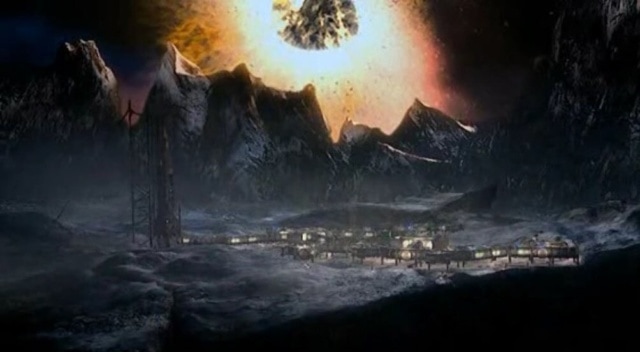
Ten and Rose land on Krop Tor, a planet suspended in perpetual orbit around a black hole. Incredibly, humans have found their way to this planet, and have built Sanctuary Base on its surface. But something wicked is haunting the crew. Horrifying faces on the screens, whispers in the night, and the enslaved Ood on the base getting possessed by some evil presence.
It turns out to be The Beast, a totally evil entity imprisoned in the heart of the planet. Rose and Ten fight for their lives against the possessed Ood, and eventually Ten reaches the monster’s prison. He destroys the gravity controls keeping the planet suspended. Krop Tor, along with The Beast, fall into the black hole.
Although Doctor Who has dealt with various versions of the Devil in previous adventures (for instance Azal the Dæmon and the Black Guardian), it had never been so unambiguous up to this point. Between its horrific concepts of Hell and Satan, the hopeless and apocalyptic location, and the NuWho twist on the classic base-under-siege formula, “The Impossible Planet / The Satan Pit” is an undeniably stomach-turning adventure that has stuck in fans’ minds for years.
“The Waters of Mars” written by Russell T. Davies & Phil Ford (Autumn Special, 2009)
Although sometimes glazed over, “The Waters of Mars,” is by far one of the most haunting David Tennant adventures.
After the loss of Donna, Ten travels on his own for a long period of time. This brings him to Mars in 2059, where a colony of scientists has discovered something terrifying on the red planet. A microorganism that has been living in the water slowly begins infecting the crew, slowly turning them into terrifying water zombies.
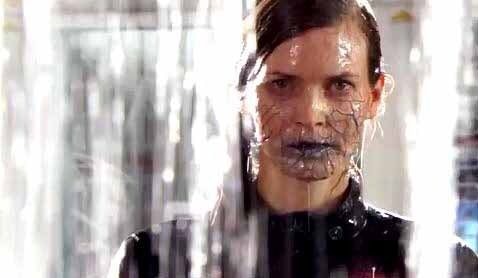
As more and more of the crew perish, Ten bonds with the base’s commander, the badass Adelaide Brook. He quickly realizes, though, that she is destined to perish along with the entire base’s crew, as part of a fixed point in Earth’s history. But weary of losing so many friends, the Doctor decides to rebel against the laws of time. He saves Adelaide and takes her back to Earth in the TARDIS.
Tragically, Adelaide realizes her death is a fixed point, and takes her own life to keep the flow of time intact. This episode is a painful reminder to the Doctor that he can’t change history. Sometimes not everyone can be saved. “The Waters of Mars” shows Ten pushed to his absolute limit. It sets up excellently for the conclusion of his character arc in “The End of Time.”
“Silence in the Library / The Forest of the Dead” written by Steven Moffat (series 4, episodes 8-9)
Another classic from Steven Moffat, this beloved story introduced Whovians to everyone’s favorite time-traveling archaeologist: River Song (Alex Kingston). (Or second favorite, depending on if you are more of a Bernice Summerfield fan.)
This episode introduces a concept so brilliant yet simple it’s a surprise no one had done it before: another time traveler who frequently encounters the Doctor, but always in the wrong order. This being River Song’s first encounter with the Doctor from his own perspective (unless you count all those Diary of River Song encounters with classic Doctors), the Doctor has no memory of her. This leads to a tantalizing dynamic of River knowing everything about the Doctor (even his real name), while the Doctor knows nothing about her.
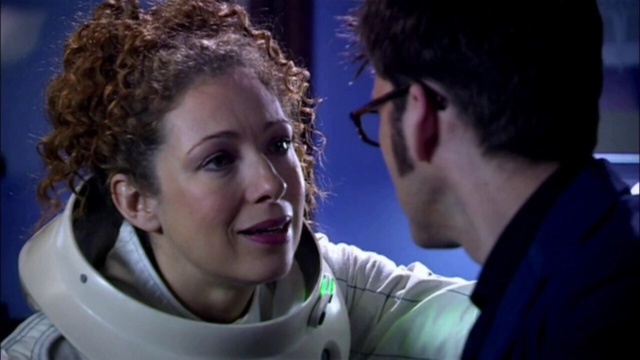
This episode ends with an epic finale: River sacrifices her life to save the Doctor. This means that, poetically, while this is the Doctor’s first encounter with River, it’s her last meeting with him. River has since appeared many times since this adventure, and we learn much more about her in subsequent episodes. But none quite capture her charm, brashness, and vexing mystery quite like “Silence in the Library” / “The Forest of the Dead.”
And that’s not even mentioning the Vashta Nerada, which are arguably the scariest monsters in all of Doctor Who. They may be even scarier than the Weeping Angels themselves. Between the Vashta Nerada, the spooktacular location of The Library, and the deeply painful sub-plot of Donna spending a lifetime with a man in a digital world without even knowing if he really existed or not, this story is pretty much a flawless piece of science-fiction. Every sci-fi fan, even non-Whovians, ought to give this episode a watch.
“Human Nature” / “The Family of Blood” written by Paul Cornell (series 3, episodes 8-9)
Back in 1995, Paul Cornell penned the Virgin New Adventures novel Human Nature for the Seventh Doctor. And in 2007, he decided the plot was so good he reused it for the Tenth Doctor.
It’s easy to see why. The concept of the Doctor going deep undercover as a human, erasing his Time Lord memories in the process, is an excellent plotline. It leads to a deeply emotional story of the Doctor falling in love with a human woman named Joan. All the while, Martha (and the audience) are forced to watch knowing they can never be together.
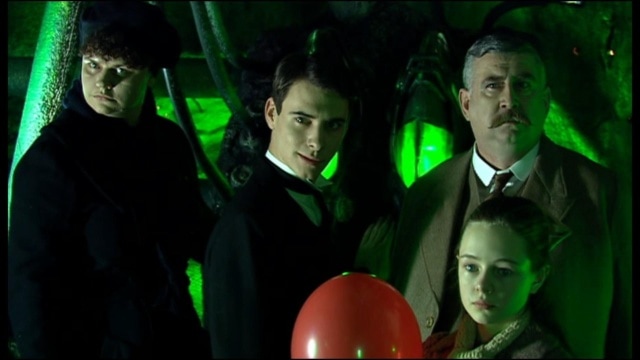
On top of the powerful emotional content, the Family of Blood are such deeply unsettling villains. It’s a shame they’ve only appeared once on screen. Between the deeply unnerving performances and the living scarecrow minions, they make one hell of an impression.
“Blink” written by Steven Moffat (series 3, episode 10)
This is not just one of the best Who episodes, but arguably one of the best TV episodes of all time. Indeed, it is the highest-rated episode of the entire 60-year run of Who, sitting pretty at a 9.8/10 on IMDB. And for an episode of Doctor Who where the titular character is hardly in it, it’s shocking that “Blink” works as well as it does.
Blink follows Sally Sparrow, played wonderfully by the Oscar-nominated Carey Mulligan. While investigating an old run-down house, she finds graffiti under the wallpaper that was left years ago. Graffiti that says her name.
This leads to a convoluted but brilliant mystery where Sally must follow clues left by none other than the Doctor all the way back in the 1930s so that she can get his TARDIS back to him and escape the impending doom. “Blink” features one of the funniest and most brilliant scenes in all of Who, where Sally communicates with the Doctor through a series of pre-recorded videos hidden in DVD extras.
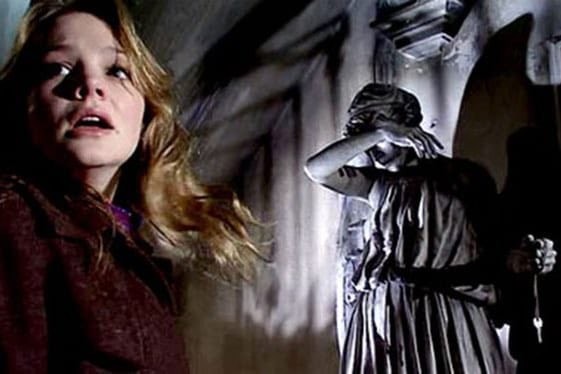
But, like so many great Who episodes, the real star of the show is the monster. And no one does it quite like the Weeping Angels. Although I’d argue there are one or two monsters scarier than them, no Who monster has wormed its way into the collective imagination (and nightmares) of sci-fi fans like the Angels. These terrifying statues that only move when unobserved are such a brilliant concept that only Steven Moffat could have written them. It’s no wonder Moffat secured his third Hugo with this script.
And on top of it all, “Blink” introduced sci-fi fans to the ever-useful phrase “wibbly-wobbly timey-wimey.” An utter masterpiece.
Tenth Doctor episodes: Honorable Mentions
“The End of Time” written by Russell T. Davies (Christmas Special 2009-New Year’s Special 2010) —The Tenth Doctor’s final episode gives a fantastic farewell to David Tennant, and a brief but memorable return of Rassilon and the Time Lords. “I don’t want to go!”
“Voyage of the Damned” written by Rusell T. Davies (Christmas Special 2007) — This surprisingly dark Christmas Special features a starship version of the Titanic, a shocking body count, and a thoughtful commentary on the Doctor’s power and responsibilities. Also: Kylie Minogue (#StreamTension).
“Turn Left” written by Russell T. Davies (series 4, episode 11) — This episode envisions a world that no Whovian wants to imagine: a dark alternate reality without the Doctor.
“Midnight” written by Russell T. Davies (series 4, episode 10) — This deeply psychological and philosophical adventure features one of the series’ most cosmically horrifying threats: a monster that we never see, never gets named, and the Doctor doesn’t even technically defeat.
David Tennant returns to Doctor Who this November! What are some of your favorite Tenth Doctor Episodes? Let us know on X or in The Cosmic Circus Discord!
Best Matt Smith’s Eleventh Doctor Episodes of Doctor Who
Best Peter Capaldi’s Twelfth Doctor Episodes of Doctor Who
Best Jodie Whittaker’s Thirteenth Doctor Episodes of Doctor Who

